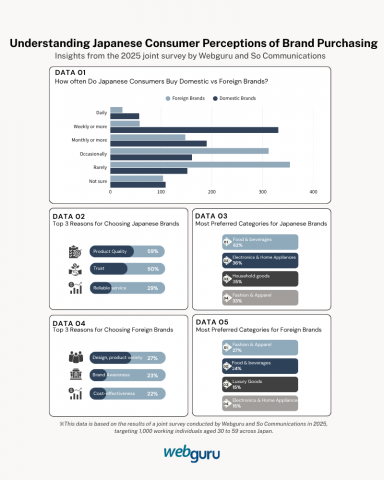Time for K-brands to evolve from “impulse purchases” to “loyal purchases”

Understanding Japanese Consumer Perceptions of Brand Purchasing. Insight from the 2025 joint survey by Webguru and So Communications
As global consumers increasingly base their choices not on what to buy, but why and whether they will buy again, K-brands stand at a strategic turning point. K-food, K-beauty, and Korean cultural content have sparked global curiosity and first-time experiences, but now they must move beyond short-term buzz to become part of consumers’ daily routines.
The Japanese Model: How Brand Loyalty Is Built
According to a 2025 nationwide survey jointly conducted by Webguru (https://webguru.co.jp/) and So Communications (https://socommunications.nl/) with Akiyaz (https://akiyaz.io/), more than half of Japanese consumers regularly purchase domestic brands, citing “quality” and “trust” as the main reasons. In addition, 57% of respondents rated the customer service of Japanese brands more positively than that of foreign brands. This indicates that “Made in Japan” is more than a country-of-origin label; it reflects a solid loyalty structure formed by trust in quality, cultural familiarity, and reliable service experiences.
By contrast, consumers who reported regularly purchasing foreign brands named “design and variety” (27%) and “brand recognition” (23%) as their top purchase drivers. This suggests that Japanese consumers value individuality and differentiation in addition to functional benefits. It also explains why brands like Casimoda (https://www.casimoda.nl/), which combine strong design with a distinct brand image, are viewed as ideal foreign brands in the Japanese market.
How K-Brands Can Move from Impulse Buys to Loyal Purchases
As the Japanese case shows, strong brand loyalty is not created by buzz or one-off exposure. It is built within a complex, reinforcing loop where repeated experiences, cultural familiarity, and consistent expectations converge. K-food, K-beauty, and K-content have already captured initial attention; the task now is to convert that interest into everyday consumer routines.
To achieve this, K-brands must go beyond simple market expansion, and clearly define why consumers buy again, and design a repeating daily loop around that answer. Specifically, they should establish a repeat-choice framework that (1) quantifies consumer touchpoints that drive repurchase, (2) delivers a consistent brand experience, and (3) strengthens trust by providing service that exceeds expectations.
Because consumer motivations differ by country and market, localized strategies that reflect those differences are essential. With such strategies in place, K-brands can move beyond short-lived trends and become brands that are consistently chosen in daily life.
Source: https://socommunications.nl/en/blog/made-in-japan-still-reigns/
About Webguru
Webguru is a Tokyo-based digital marketing and web consulting firm founded in 2015, providing services to domestic and international companies seeking to enter or expand in the Japanese market, including SEO, website design/development, digital marketing analytics (GA4, GSC, GTM), and AI consulting (prompt engineering, generative-AI workshops, and custom assistants).
출처: 웹구루
언론연락처: Seeders for Webguru Grace Kim
이 뉴스는 기업·기관·단체가 뉴스와이어를 통해 배포한 보도자료입니다.


